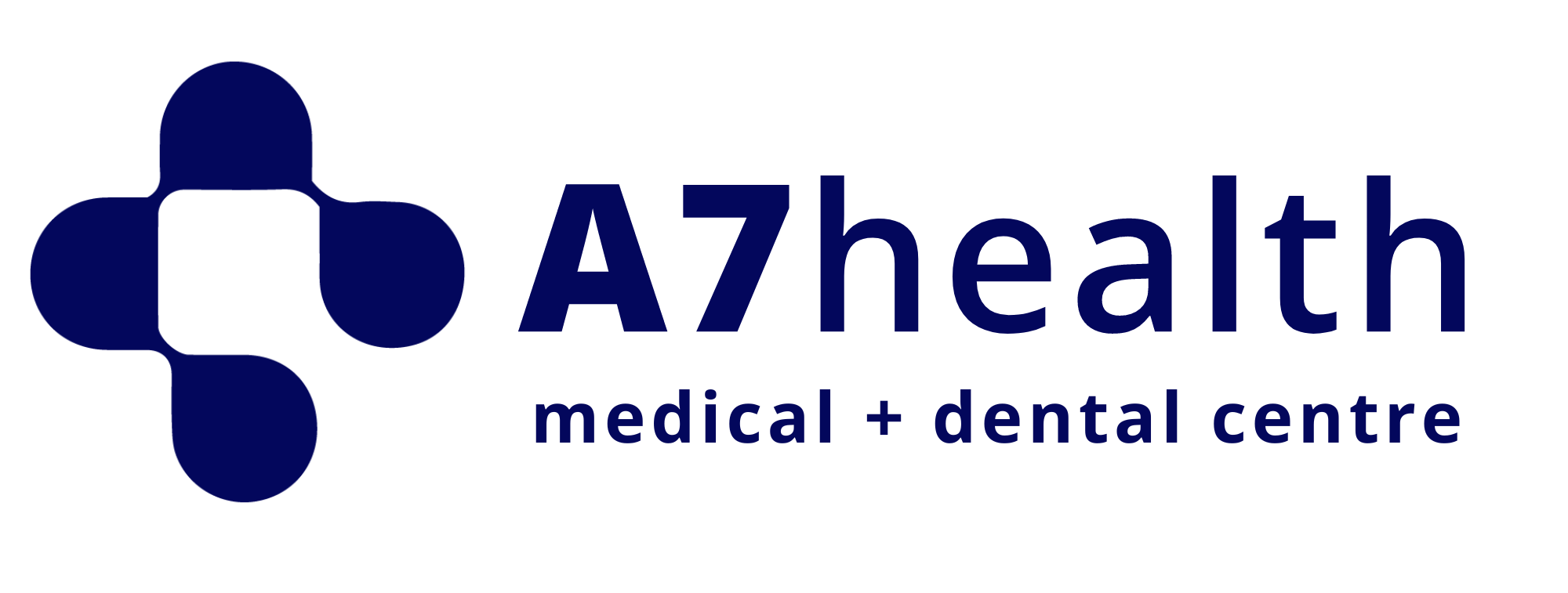Headaches
A headache is pain in the head or face, often described as throbbing, constant, sharp or dull pressure. Headaches can vary widely in pain type, severity, location, and frequency.
If you struggle with regular headaches or migraines, there may be a treatable underlying cause. Schedule an appointment with a A7 Health practitioner.
What causes headaches?
The pain you feel when you have a headache is caused by a mixture of signals between your brain, blood vessels and surrounding nerves. Certain nerves in your blood vessels and head muscles turn on and send pain signals to your brain. Common causes of headaches include:

- Illness – These may include infections, colds, and fevers. Headaches are also common with conditions such as sinusitis (inflammation of the sinuses), a sore throat, or an ear infection.
- Injury – In some cases, headaches may be the result of a blow to the head from an accident, a fall, or during sports.
- Stress – Emotional stress and depression, as well as alcohol consumption, skipping meals, changes in sleep patterns, and taking too much medication.
- Poor posture – Neck or back strain due to poor posture.
- Environment – Second-hand tobacco smoke, strong odours from household chemicals or perfumes, allergens, and certain foods. Stress, pollution, noise, light, and weather changes are other possible triggers.
- Genetics –Headaches, especially migraines, are common in families. Most children and adolescents (90%) who suffer from migraines have other family members who are also affected.
Types of headaches
The most common types include:
- Tension Headaches – Tension in the muscles of the neck, shoulders and upper back can cause headaches. The pain usually objectively mild.
- Migraine Headaches – These headaches are more severe and can last from 4 hours to 3 days and usually occur one to four times per month. In addition to the pain, other symptoms include sensitivity to light, noise, or odours; nausea or vomiting; loss of appetite; and stomach upset or abdominal pain.
- Cluster Headaches – These headaches are quite severe and usually occur in groups (hence the name). You may have intense burning or stabbing pain behind or around one eye. The pain may be throbbing or constant. On the side of the pain, the eyelid droops, the eye reddens, the pupil becomes smaller, or the eye waters. The nostril on that side runs or is blocked.
- Chronic Daily Headaches – This type of headache lasts 15 days or more a month, longer than 3 months. Some are short. Others last longer than 4 hours.
- Sinus Headaches – Usually, a deep and constant pain is felt in the cheekbones, forehead or on the bridge of the nose. It occurs when cavities in your head, called sinuses, become inflamed. The pain is usually accompanied by other sinus symptoms, such as a runny nose, blocked ears, fever, a swollen face, and the snot is usually yellow or green – a sign of infection.
- Posttraumatic Headaches – Posttraumatic stress headaches usually begin 2-3 days after a head injury. Symptoms include a dull ache that worsens from time to time, dizziness, lightheadedness, and difficulty concentrating or remembering. These headaches should be monitored by a doctor.
Less common headaches:
- Exercise Headaches – During physical activity, the muscles in your head, neck and scalp need more blood and your blood vessels swell to supply them. The result is a pulsating pain on both sides of your head that can last from 5 minutes to 48 hours.
- Hormone Headaches – Headaches may result from altered hormone levels during menstruation, pregnancy, and menopause. Hormone changes from birth control pills and hormone replacement therapy can also trigger headaches.
- Rebound Headaches – Also called medication overuse headache. Excessive use of prescription or over-the-counter pain killers (more than two or three times a week or more than 10 days a month) can lead to dependency. Once the medication wears off, the pain returns and you need to take more to stop it.
Rare headaches:
- Ice Pick Headaches – Theses are described as short, stabbing, intense headaches that usually last only a few seconds. Ice pick headaches can be a condition on their own, but they can also be a symptom of something else and you should see a doctor.
- Spinal Headaches – You may have a headache after a lumbar puncture, spinal block, or epidural. They are also called puncture headaches because the membrane surrounding your spinal cord is punctured during these procedures.
- Thunderclap Headaches – Often described as the worst headache imaginable. They come on suddenly out of nowhere and peak quickly. Take sudden headaches seriously because they may be the only warning sign of a serious problem such as a stroke (blocked or ruptured blood vessel in the brain), cerebral hemorrhage (bleeding in the brain), or head injury.
Treatment for headaches
Treatment for headaches depends on the type. One of the most crucial aspects of treating primary headaches is figuring out the underlying cause.
Physiotherapy – A physiotherapist will perform a comprehensive examination to diagnose the nature of the headache. Based on the findings, they will develop the most effective treatment plan to:
- Decrease or resolve the intensity, frequency, and duration of headaches
- Decrease medication use
- Improve ease of motion in the neck
- Relieve joint and muscle stiffness
- Increase mobility of the head and neck
- Decrease muscle tension and spasms
- Improve muscle performance
- Improve quality of life
Stress management – Stress management teaches you how to deal with stressful situations. Relaxation techniques help you manage stress. They use deep breathing, muscle relaxation, mental imagery, and music to relieve your tension.
Biofeedback – Biofeedback teaches you to recognize when tension is building in your body. You learn how your body responds to stressful situations and ways to settle it down. During biofeedback, sensors are connected to your body. They monitor your involuntary physical responses to headaches, such as breathing rate, pulse, temperature, muscle tension and brain activity.
Medications – Occasional tension headaches usually respond well to over-the-counter pain relievers. But be aware that using these medications too often can lead to long-term daily headaches (medication overuse headaches). For frequent or severe headaches, your doctor may recommend prescription headache medications.
Treatment at A7 Health for Headaches:
Get Physiotherapy for Headaches – Book an appointment with a Physiotherapist at A7 Health to identify the underlying cause of your headaches and treat it. Some of the treatments include:
- Massage for pain relief and to release muscle tension and spasms.
- Mobilisations on any stiff joints or pinched nerves in your neck, shoulders and lumbar spine.
- Strengthening exercises for your abdominal muscles (core).
- Posture correcting exercises.
